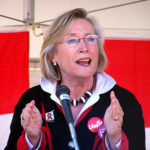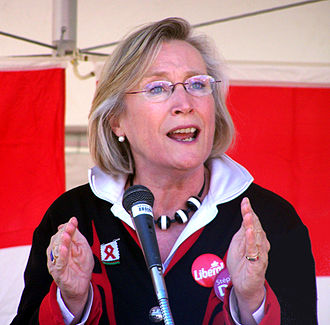
There may be some doubt about whether a member of a government caucus that has just won three consecutive majorities with less than 42 per cent of the vote can engage in a sincere conversation on electoral reform. But for much longer than I have been elected have I been inspired by author, activist and supporter of proportional representation Doris Anderson. Like most Canadians I want things to be “fair” and there are definitely some legitimate questions about the “fairness” of the present system.
Ursula Franklin has stated that good government or governance must be “fair, transparent and take people seriously.” We must have as our goal “a government that works” and “a population that is confident in the system.” She believes that the yardstick by which we can measure these goals is participation. We need:
- Good people to run for office
- Good voter turnout and
- Good civic organizations that feed into government.
On all three counts we’re in trouble. That’s most obvious with respect to voter turnout, but the demise of great organizations like Citizens for Local Democracy in Toronto is also of deep concern. This organization fought the megacity to obtain a referendum result of 76 per cent opposing the merger and then was summarily ignored by the provincial government. To me this speaks volumes about why citizens see themselves as politically impotent and, as a result, quite understandably exhibit increasing cynicism about the responsiveness and relevance of government.
The private sector has for a long time used CQI (continuous quality improvement) as a means to stay responsive to consumer needs and maintain their competitive edge. Companies that haven’t focussed on growth and changing times have foundered. All organizations that cling desperately to the status quo and refuse to adapt, eventually weaken and become out of step with the people they serve. Parliamentarians must constantly ask themselves whether government is “good enough” or could be better. We must never take our democracy for granted. It must be a “living” organism. We must constantly ask what we can do to make citizens more confident in their government. EKOS Research Associates’ polling data suggests we are on a downhill slide in Canadians’ assessment of whether or not they can trust government to do the right thing. We ought not think that we should return to the days when citizens accepted the paternalistic “father knows best” approach. We must act to prevent any further diminution in the respect and dignity of the institution of Parliament. We have an obligation to hand over a democracy that is at least as robust as the one we inherited— and to recommit to trying to make it even stronger.
I will divide my comments into three sections: the anatomy of our democratic deficit; possible remedies; and three lenses for electoral reform.
In terms of a democratic deficit, I can see five main areas for discussion: executive federalism, strong external forces, election result distortions, voter turnout and voter parity.
Our parliamentary democracy has been threatened by the emergence of an executive federalism that has skirted parliamentary decision-making. First ministers’ meetings have taken on such inordinate prominence that once a “deal is done” the federal Parliament and provincial and territorial legislatures can only approve what their executives have negotiated. As constitutional expert and MP Irwin Cotler has said, “the legislative branch is caught in a pincer movement between an enhanced judicial branch and enhanced executive branch.” He argues that other strong external forces diminishing the effectiveness of Parliament are the media’s evolution to a “celebrity” culture and the increasing importance of non-governmental organizations that have virtually written off government in the new globalized world.
In the past decade, election result distortions have been disquieting to increasing numbers of Canadians. As Doris Anderson wrote after the 1995 Ontario provincial election “under the first-past-the-post system we get distortions that don’t reflect how people voted.” In l993, Canadians were upset to see that the Bloc Québécois could form the Official Opposition with 54 seats although they captured a much smaller percentage of the popular vote than the Tories. In l998, in Quebec the PQ was able to form a majority separatist government even though it won a smaller percentage of the popular vote than the Liberals. Last year’s federal election resulted in a number of distortions in the electoral system. Probably the most ignored was the Alberta result in the last election where the Liberals won 20.9 per cent of the vote but only 7.7 per cent (that is, two) of the seats.
Decreasing voter turnout, which has become increasingly alarming in the past 15 years, threatens the very legitimacy of democracy. Turnout has fallen steadily from 75.3 per cent in 1984 to 61.8 per cent this past year. A number of explanations have been offered for this, from short term problems with enumeration or the entrants in last year’s horse race, to the longer-term decline of either the “social capital” that Harvard’s Robert Putnam has talked about or the simple “neighbourliness” that Jane Jacobs laments.
Young voters are even more telling. Their turnout went from 51 per cent in 1997 to even lower last year. D-code’s Social Vision Paper released this April quoted one participant as saying: “The reason young people are not getting involved is not because they don’t care, not because they don’t think that politics concerns them, and not because they don’t think that their vote counts—it’s because there is no one to vote for, that is no one who represents young peoples’ interests, instead of choosing the lesser of the evils, young people often choose not to vote.” It’s worrying that some young people clearly think that it’s more valuable to be outside the fence in Quebec City than to vote or talk to their elected representatives.
Voter parity in Canada has been controversial since Sir John A. Macdonald. Even when I visit the Grade 5 classrooms in my riding, I am asked why the votes of the people of St. Paul’s count so much less than votes in PEI! In his introduction to the Act to Readjust the Representation in the House of Commons in 1872 Sir John A. said “… it will be found that … while the principle of population was considered to a very great extent, other considerations were also held to have weight; so that different interests, classes and localities should be fairly represented, that the principle of number should not be the only one.” More recently, in the Reference re Provincial Electoral Boundaries in 1991, the Supreme Court said that the Section 3 Charter right to vote guaranteed a right to “effective representation” not “voter parity.” The Court decided that absolute voter parity may be practically impossible and even when possible may actually detract from the primary goal of effective representation when geography, community history, community interest or minority needs are a factor. The elected representatives function in two voices: as legislators and as ombudsmen for their constituents. In a country of vast, sparsely populated territories and varied district interests, deviations from voter parity may be necessary to ensure effective representation for all.
Electoral reform is definitely a remedy that should be considered for our democratic deficit, but I strongly believe it must be done in the context of other necessary reforms. It cannot work alone. Electoral reform can only be successful in concert with renewed democracy between elections, parliamentary reform and party reform.
In his background paper for our Dialogue St. Paul’s 2000—The Role of the Citizen and the Elected Representative, Bill Young from the Library of Parliament stated that: “social contract in our democracy is founded on the consent of the governed … This implies not just that voters select their governments, but also that there is more or less continuous contact between citizens and their elected representatives in order to exchange knowledge and opinions. It also implies the expression of preferences on the part of the citizen as well as a certain level of attentiveness and consciousness of what government is doing or wants to do.”
EKOS Research Associates’ Rethinking Citizen Engagement found that the majority of citizens felt we could solve the majority of our national problems if decisions could be brought to people at the grassroots level. Citizens also felt that they had too little influence in defining public policy. (Parliamentarians did, too!) They thought that the media, business leaders and lobbyists had too much power.
Citizen engagement can’t just mean consulting, for the sake of consulting. The young d-coders were clear in the Social Vision Paper “My opinion doesn’t matter. Whoever is in government does whatever they want.” Frank Graves of EKOS Research Associates calls it a need for “assured listening.” There are already many good examples of “assured listening”—participants in the federal pre-budget consultation can often see their good ideas harvested. The Health Committee’s 1997-98 study on natural health products resulted in all 52 recommendations being accepted by the Minister. The new concept of “e-democracy” can be a huge opportunity for tracking the successful inputs of citizens.
The need for improved relevance and responsiveness of parliament to citizens becomes an important ingredient to the second remedy—parliamentary reform. Parliamentary reform can be looked at on at least four levels: the things Parliamentarians can do in their ridings on their own; changes that can be made within the caucus culture; changes that would require all-party consent and changes that require constitutional amendments. Parliamentary reform will have to address the role of Parliament vis-à-vis the government, an examination of the way the House of Commons operates, increased scrutiny and policy development by standing committees— indeed enough for another article.
The government of the day must give the opposition its rightful place in Parliament: The opposition’s role is integral to good government. Opposition members must be more than ornamental. Some of the changes proposed in current discussions of parliamentary reform, like bringing “green papers” and draft bills to committee, would help immensely. Observers argue that the extremely partisan nature of the “pizza parliament” since 1993 has seriously eroded the potential constructive contribution of the opposition. Moving to an electoral system that constantly requires cooperation among the parties could improve the relationships between them—even if watching the Knesset might suggest otherwise!
The leadership of political parties generally don’t like minority governments. Yet Canadians seem to think otherwise. As well, inside observers have commented that they can be great for policy entrepreneurs on the back benches. Lester Pearson’s minority government from 1963-68 is viewed in hindsight as one of our best, with Medicare, Canada Student Loans and the Canada Pension Plan among its legacies. Historian John English has asked whether its effectiveness was because the Liberals had put forward focussed, marketable ideas, or because Tommy Douglas was a willing collaborator or because it lived in fear of John Diefenbaker—perhaps it was all three. Whatever the reason, minority government worked and people had confidence in it.
The third remedy is party reform. Ursula Franklin has argued that if her definition of good governance as fair, transparent and taking people seriously is not applied in our small local organizations how could we ever hope to have it applied in government writ large. Political parties by definition must adhere to those principles— i.e., be democratic organizations not managed democracy. An inclusive, transparent and accountable policy process is hard to achieve now. Democratizing the parties would become even more important should the parties also be responsible for developing candidate lists for proportional representation or members-at-large for a mixed system. Party members should be able to ensure that the party isn’t compromising its core values in its platform. Experts have observed that in a reformed electoral system that provides more choices increasing clarity is possible in party platforms. A truly democratic party can reel in the leadership after any significant departure in signature policies and values.
Technology can provide a truly engaged membership. Akaash Maharaj, Vice President of Policy Development for the Liberal Party of Canada, now has over 14,000 members on-line discussing Liberal policy. However in the last election the platform was developed totally outside that process. We were asked what we might like in the Speech from the Throne when it was probably already at the printer! Party processes must be genuine and accountable. That includes a bureaucracy accountable to the membership and elected national board, not just the Leader’s office.
The fourth remedy is indeed electoral reform. However, the ultimate goal of a government that works and a public that is confident in its relevance and responsiveness will only happen if electoral reform takes place simultaneously with the other three reforms.
In Canada’s Democratic Deficit—Is Proportional Representation the Answer? (CSJ Foundation 2000) Denis Pilon provides an excellent overview of the choices. From STV to MMP to STV+, there is a full menu of choices and there are political scientists much better able to discuss and manicure the “perfect system.” I would prefer to provide three lenses or principles through which these deliberations should take place: regaining credibility; electing more women; and retaining constituency representatives.
Eliminating the alarming distortions in electoral results and thereby giving citizens the government that reflects the actual votes received will go a long way to restoring the legitimacy of our elected bodies. However, that legitimacy must be earned by ongoing responsiveness as well. Governments can’t just press on and do things that were never articulated in the platform, such as closing hospitals or merging municipalities without genuine public consultation.
This does not mean that governments can’t be permitted to change their minds when circumstances change dramatically and the policy articulated in a platform is no longer in the public interest. Citizens must also be able to see that they can make a difference—that there is feedback for their inputs. Even if their views don’t prevail, they must see a fair process and a fair outcome. The consultation that takes place between elections must not just be occupational therapy for the opposition—designed to keep them (and the stakeholders) busy.
When I graduated from medical school in 1974, women were 20 per cent of the class. It is astounding that in 2001 women are still only 20 per cent of the class in today’s House of Commons. Medical schools have long ago surpassed 50 per cent and now more properly reflect the true face of Canada. European parliaments now have between 25 per cent and 45 per cent women. PR did not achieve this on its own, however. In France, despite a pure PR system, women remained at 10 per cent of the National Assembly. Increasing the representation of women requires political will regardless of the electoral system used. Women may believe, however, that equity may never be achieved in a first-past-the-post system. The Lortie Commission did not deal with electoral reform but cited both the nomination system and the financial disadvantages women suffer from as obstacles to their greater participation in the electoral process.
While the equality argument is extremely important, it is also important to recognize that what is at stake is more than just equity in numbers. If we accept that women think differently and are more inclusive in their decision-making, we should also accept that having more women at the table affects the results—which are different and may often be better. In this regard, a recent World Bank research report focusing on women and corruption is particularly compelling. After reflecting on the many behavioral studies that have found women to be more trustworthy and public-spirited than men, the authors report their own results, which suggest that women should be particularly effective in promoting honest government: The researchers found that the greater the representation of women in parliament, the lower the level of corruption.
Having a more inclusive approach ensures that more points of view and possible consequences are considered. It widens the spectrum of voices and thereby frames the context for democratic deliberations differently and, in my view, better. This framework can also mean that other expert voices could and should be included in the selection of members at large. Various professions and skill sets can play a valuable role in seeking out the best possible advice. Knowing which stakeholders should be talked to becomes important in outlining the full menu of choices and thereby coming to the best possible solutions.
Community roots enhance personal legitimacy and permit the direct accountability that is inherent to “effective representation.” For this reason, genuine two-way communication with a designated population has to be preferable to a pure PR system. I was surprised to hear from elected representatives from pure PR systems that they felt obligated to become concurrently president of a NGO or charity in order to gain visibility and a “virtual constituency.” They are certainly very aware of the potential opportunities of the Internet.
In a country as large and diverse as Canada, it is imperative that we have members of Parliament that are experts in and advocates for the needs of the specific regions of the country. It is also important in such a diverse country for MPs to return to their constituencies to explain the very different points of view of members from other regions. This should in no way be a partisan activity nor one confused with a one-way message from Ottawa. We need to learn continually about the needs of all parts of Canada and all Canadians. A pure PR system would sacrifice this important function. On the other hand, the electoral system used to choose the constituency representatives could be amended to ensure that the member had the support of at least 50 per cent of voters in the riding. To that end, either a preferential ballot or a second runoff ballot could be considered.
Retaining the constituency members could be enhanced by topping up with “members-at-large” to reflect the percentage of the vote. Not only could this be the antidote to electoral distortions, but it could also help ensure a Parliament that more accurately reflects the face of Canada. A party would be advised to be seen to be topping up towards meeting the goal of more women, Aboriginals, visible minorities, persons with disabilities and others who might be underrepresented in a first-past-the-post system. Adding members with professions and skill sets otherwise missing could also be a consideration in trying to enhance the quality of deliberation and the credibility of the government. These representatives would have constituencies as well— just not geographic ones. Canadians from across the country could see these people as “their voice” in Ottawa.
To summarize:
- We must move immediately to improve the role of citizens in our democracy between elections.
- We must enhance the role of the 301 “engaged citizens” who currently make up the Parliament of Canada, so as to ensure more effective representation for the 30 million Canadians they represent.
- We must work on the same rules for good governance of “fair, transparent and takes people seriously” for our political parties.
- We should begin to explore a “made in Canada” version of electoral reform that would serve to regain credibility for the government, see that more women and minorities were elected and yet keep constituency members in the majority.
Doris Anderson has argued that the lure of the “Big Win” in our political lottery has been the main obstacle to getting on with electoral reform. The past decade of increasing cynicism and apathy has meant that we need to consider all the options again. The legitimacy in numbers that electoral reform could bring will not on its own strengthen our democracy. Without the concurrent education and motivation of citizens, an increased effectiveness and dignity of those in public life and a car wash for partisan activity, we risk further weakening our democracy. We can’t let that happen.
Photo: Shutterstock









